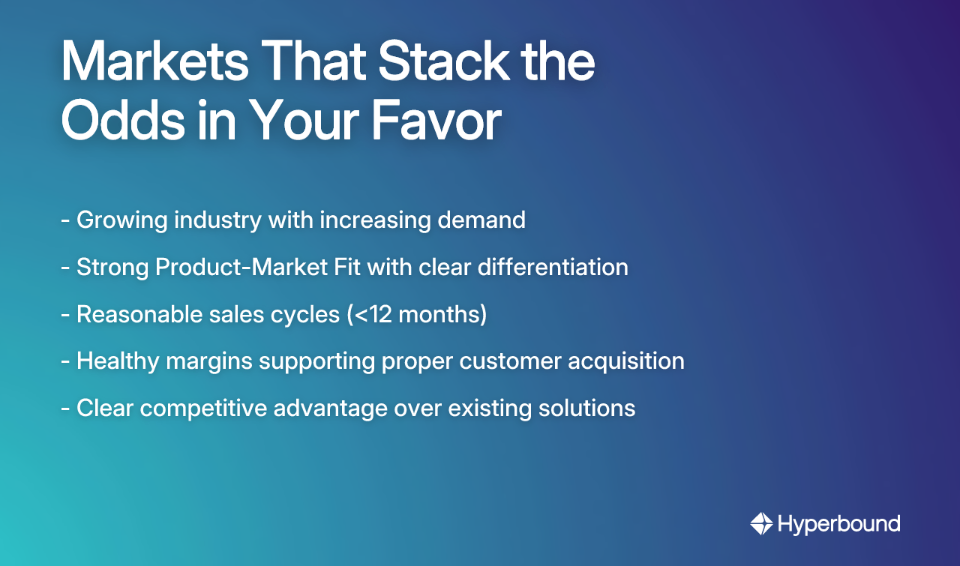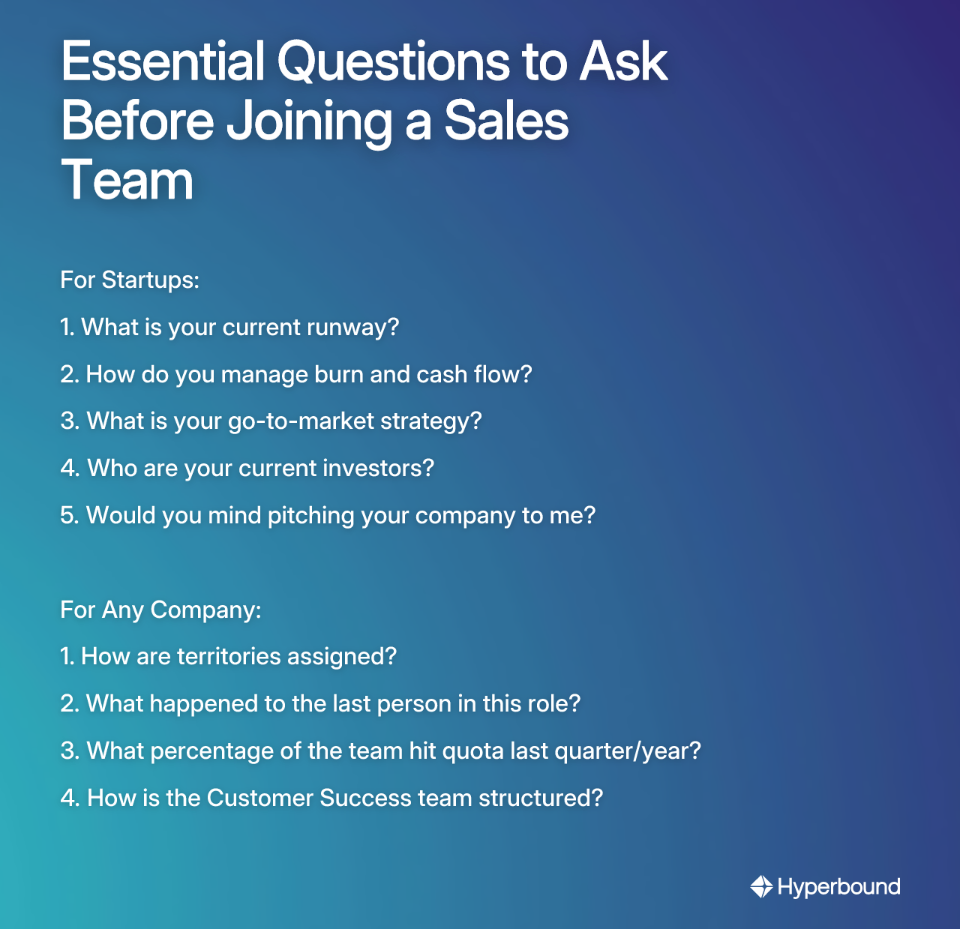
You've set up countless meetings, perfected your pitch, and put in the hours—yet success feels frustratingly random. One quarter you're crushing it; the next, you're struggling to meet half your quota. "Every role is a gamble," as one sales veteran puts it. "I just wanted to show up, do what's asked and get paid, but that doesn't always correlate to success."
Sound familiar? The truth is, sales success often feels like a casino game where the house always wins. But what if you could be the house?
While you can't control every factor affecting your sales performance, you can strategically choose which game to play and master the skills needed to tilt the odds dramatically in your favor. This isn't about luck—it's about understanding that sales success is determined by two critical factors:
- The table you choose to play at (your company, market, and product)
- How skillfully you play your hand (your process, skills, and adaptability)
By making smarter choices about where you work and what you sell, while mastering the aspects of sales within your control, you can transform an unpredictable gamble into a calculated risk with predictable returns.
Choosing Your Table: Stacking the Deck Before the Deal
Just as a professional poker player carefully selects which games to join, top sales performers understand that choosing the right company and market dramatically improves their odds of success. This section focuses on making strategic career decisions that set you up to win before you even start selling.
Picking the Right Market
When interest rates were at historic lows during the ZIRP (Zero Interest Rate Policy) era, almost any product could find buyers. "When interest rates are low, money flows like wine," notes one sales professional. "But when rates rise, the economy slows down and consumer spending dries up."
Today's economic reality demands more discernment. Before joining a company, ask yourself a simple but powerful question borrowed from startup advisor Brett J. Fox: "Whose lunch are you stealing?" If you can't clearly identify which competitors your company can outperform—or why customers would switch—you're likely entering a market where success will be unnecessarily difficult.
Consider the plight of sales reps in challenging markets: "The market itself is rough because it's food service, zero margin anywhere, making it hard to win over prospects." No amount of sales skill can overcome fundamentally broken market economics.
Markets with these characteristics typically offer better odds:

- Growing industry with increasing demand
- Strong Product-Market Fit (PMF) with clear differentiation
- Reasonable sales cycles (beware the 12+ month B2B slog)
- Healthy margins that support proper customer acquisition costs
Vetting the House (The Company)
"A big thing people new to sales don't recognize is that your interview is also an interview from you," explains one seasoned rep. This insight is particularly crucial when considering startup opportunities, where the risks and rewards are amplified.
According to Bibi Careau's research on startup evaluation, you should expect startup salaries to be 10-30% lower than at established companies. This salary sacrifice is essentially a bet on accelerated professional growth and potential equity upside.
Before accepting any sales role, thoroughly vet the company with these crucial questions:

For Startups:
- "What is your current runway?" (Hesitation is a major red flag)
- "How do you manage your burn and cash flow?"
- "What is your go-to-market strategy?"
- "Who are your current investors?" (Research them beforehand)
- "Do you have a pitch deck? Would you mind pitching your company to me?" (This tests their clarity and conviction)
For Any Company:
- "How are territories assigned?" (Look for fairness and transparency)
- "What happened to the last person in this role?"
- "What percentage of the sales team hit quota last quarter? Last year?"
- "How is the Customer Success team structured and resourced?" (If they don't invest here, renewals will suffer)
Ask yourself these tough questions too: "Am I okay if I lose this job in a year? Can I handle uncertainty in my day-to-day responsibilities? Can I financially manage a lower salary and uncertain equity outcomes?"
Understanding the House Rules (Compensation & Territory)
The cards you're dealt matter enormously. "Did you get Manhattan or London or did you get Birmingham?" asks one rep, highlighting how Territory Assignment can make or break your numbers regardless of skill.
Beware of companies where "some managers and directors feel like their job is to anoint themselves the arbiter of who should be successful." Internal Politics can undermine even the most talented salespeople if the system is rigged against them.
Key factors to evaluate:
- Quota structure: Is it reasonable based on historical performance and market conditions?
- Territory equality: Are opportunities fairly distributed?
- Commission structure: Is it transparent and motivating?
- Sales Cycle length: Shorter cycles mean more chances to win
- Pipeline generation: Is marketing providing quality Inbound Leads or are you building from scratch?
Playing Your Cards: Mastering What You Can Control
Once you've chosen your table wisely, it's time to focus on playing your hand with skill and precision. This is where your daily habits, processes, and skills development come into play.
Mastering the Craft: From Cold Calls to Strategic Mastery
Top performers are perpetual students of the game. As Anthony Iannarino describes in his journey from basic cold caller to strategic sales leader, the path to excellence requires moving beyond rigid sales scripts to develop adaptable skills.
Modern selling, particularly in complex B2B environments, requires a flexible, nonlinear approach. You must be able to navigate the dynamic nature of sales conversations, especially when selling SaaS (Software as a Service) solutions with longer sales cycles.
Invest in your skills development. AI-powered coaching platforms like Hyperbound are built for this, allowing you to practice and get feedback in realistic scenarios. The best salespeople view skill development as a career-long commitment, not a one-time training exercise.
Reading the Player (Buyer Psychology)
Your job is to make the buyer feel confident in their "bet." According to Jeff Shore's research on gambling theory in sales, your buyer is subconsciously asking two questions:
- What is the probability of a favorable outcome?
- What are the consequences of a win or a loss?
Remember that buyers fear losses more than they value gains—often at a 2:1 ratio. Your role is to mitigate this focus on potential losses by highlighting the strong probabilities of successful outcomes.

In practice, this means shifting the conversation from price (the cost to play) to ROI (Return on Investment) and COI (Cost of Inaction). Make the purchase feel like a statistically sound decision, not a risky gamble.
Effective techniques include:
- Providing social proof through relevant customer success stories
- Quantifying the specific business impact of your solution
- Creating a clear implementation plan that minimizes disruption
- Offering guarantees that reduce perceived risk
Building Your Table Image: Navigating Internal Politics
Your internal reputation directly impacts your external opportunities. "My job has been incredible because of the support I get from my boss," shares one fortunate sales rep. Good internal relationships are a force multiplier for your sales efforts.
Follow these essential practices:
- Be reliable: "Show up to your internal meetings on time and prepared. Update your CRM (Customer Relationship Management). Have good notes."
- Manage up effectively: "Agree with your manager publicly, express concerns privately. If they ask you to do something, do it quickly and correctly."
- Become the go-to player: When you're respected internally, "Sometimes a referral comes their way and they hand it off to you discreetly so you can close it."
Your Value Proposition to the outside world means nothing if you can't build credibility with your internal stakeholders first.
The Power of Process
A consistent process is your defense against chaos and uncertainty. "Keep in mind that consistency of process is a hedge against the 80%" of factors outside your control, advises one successful rep.
Create a personal, non-negotiable routine for:
- Prospect research before calls
- Rigorous CRM updates after every interaction
- Strategic follow-up sequences
- Daily pipeline management
- Weekly self-assessment of key metrics
"The reality is that most people don't outbound enough," notes one manager. High activity levels, when guided by intelligent processes, remain the best predictor of sales success. This disciplined approach is what you lean on when the market is tough or morale is low.
For Closing Sales consistently, your process must be repeatable and refined through continuous improvement. Document what works, analyze what doesn't, and make incremental improvements to your approach with each opportunity. This is where AI-powered tools like Hyperbound's Real Call Scoring can provide a significant edge, automatically analyzing your conversations to give you objective data on what's working.
Cashing In Your Chips
Sales is indeed a gamble, but you're not a helpless player at the mercy of chance. By strategically choosing your table and skillfully playing your hand, you can dramatically improve your odds of success.
Remember the two levers of control:
- Choose Your Table: Be incredibly deliberate about the market, company, and product you align with. Do your due diligence during the interview process to ensure you're joining a game you can win.
- Play Your Cards: Relentlessly focus on what you can control: your skills, your process, your understanding of buyer psychology, and your internal reputation.
The most successful salespeople acknowledge external challenges without becoming victims to circumstance. As one veteran puts it, "You can acknowledge they exist without becoming a victim to circumstance."
By stacking the deck strategically and playing your hand with skill, you can transform sales from an unpredictable gamble into a game where you consistently come out ahead. The house doesn't always have to win—sometimes, that house can be you.

Frequently Asked Questions
What are the two most important factors for sales success?
The two most important factors for sales success are the "table" you choose to play at (your company, market, and product) and how skillfully you "play your hand" (your process, skills, and adaptability). This means your success isn't just about individual effort. It begins with making a strategic choice to work for a company with a strong product in a healthy market. Once you've made a good choice, your success is then determined by your personal commitment to mastering your craft, following a consistent process, understanding buyer psychology, and building strong internal relationships.
Why is choosing the right market and company so critical for a salesperson?
Choosing the right market and company is critical because it stacks the odds of success in your favor before you even make a single call. A strong company with a great product-market fit in a growing industry provides the foundation for success. No amount of sales skill can consistently overcome poor market economics, a weak product, or a company with internal issues. Vetting your employer is as important as them vetting you.
How can I effectively evaluate a company during the sales interview process?
To effectively evaluate a company, you must interview them as much as they are interviewing you by asking strategic questions about their financial health, go-to-market strategy, and team performance. For startups, ask about their financial runway, burn rate, and investors. For any company, inquire about how territories are assigned, why the last person left the role, and what percentage of the team hits quota. Their answers (or hesitation) will reveal the stability and fairness of the sales environment.
What skills should a modern salesperson focus on developing?
A modern salesperson should focus on developing adaptable skills that go beyond rigid scripts, including understanding buyer psychology, mastering a non-linear sales process, and effectively handling objections. Top performers are perpetual students. They invest in their own development through practice, coaching, and continuous learning. Using tools like AI-powered coaching platforms can help you practice realistic scenarios and get objective feedback, accelerating your path from a basic seller to a strategic advisor.
How does understanding buyer psychology help close more deals?
Understanding that buyers fear loss more than they value gain helps you frame your solution in a way that minimizes perceived risk and builds confidence. Your role is to shift the buyer's focus from the price (the "cost to play") to the strong probability of a positive outcome. You can do this by highlighting the Return on Investment (ROI) and the Cost of Inaction (COI), providing social proof with customer stories, and offering guarantees to make the purchase feel like a safe, logical decision.
Why is a consistent sales process so important?
A consistent sales process is your hedge against the many factors outside your control, providing structure and predictability in an otherwise uncertain role. By creating a non-negotiable routine for prospecting, CRM updates, follow-ups, and pipeline management, you build discipline. This process-driven approach, combined with high activity levels, is one of the best predictors of success. It's what you rely on to keep moving forward when the market is tough or a deal falls through.
Book a demo with Hyperbound
.png)













